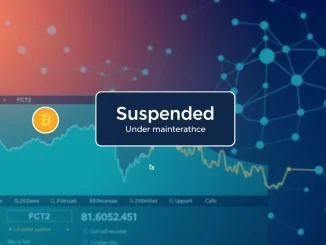
Get ready for a potential seismic shift in the cryptocurrency landscape of South Korea! Presidential hopeful Hong Joon-pyo, a prominent figure from the conservative People Power Party, has ignited excitement within the crypto community by vowing to implement a radical, Trump-inspired approach to South Korea crypto regulation. This pledge, made during a recent policy forum, signals a potential departure from the current regulatory environment and hints at a more permissive future for digital assets in the nation. Could this be the dawn of a new era for crypto in South Korea? Let’s dive into the details of Hong’s audacious plan and explore what it could mean for the industry.
Hong Joon-pyo’s Bold Promise: Trump-Style South Korea Crypto Regulation
Hong Joon-pyo isn’t mincing words. He’s explicitly stated his intention to mirror the regulatory stance of the Trump administration when it comes to cryptocurrency. But what exactly does this entail? Here’s a breakdown of his key promises regarding South Korea crypto regulation:
- Regulation Reduction: Hong has pledged to significantly slash the existing web of regulations surrounding blockchain and cryptocurrency. This implies a move away from stringent controls that many in the industry have found stifling.
- Trump Administration Model: By invoking the Trump administration, Hong suggests a lighter regulatory touch, potentially fostering innovation and growth within the crypto sector. During Trump’s presidency, while there wasn’t a single, unified federal crypto policy, the general approach was perceived as less interventionist compared to some other nations.
- Industry Recognition: He aims to formally recognize virtual assets as a distinct industry, lending legitimacy and potentially unlocking further avenues for development and investment. This recognition is crucial for mainstream adoption and institutional involvement.
- Government Blockchain Integration: Beyond just virtual assets, Hong is advocating for the proactive implementation of blockchain technology within government services. This could streamline processes, enhance transparency, and potentially reduce bureaucratic inefficiencies.
This ambitious agenda paints a picture of a South Korea eager to embrace the potential of crypto and blockchain, moving away from potentially restrictive policies towards a more enabling environment. But what are the potential benefits and challenges of such a drastic shift?
Unleashing Blockchain in Blockchain Government Korea Services: A Vision for the Future?
Hong’s vision extends beyond just easing regulations on cryptocurrencies; he’s also championing the integration of blockchain technology into blockchain government Korea services. This is a powerful proposition with the potential to revolutionize how the South Korean government operates. Let’s explore the potential benefits:
| Benefit | Description | Example Applications |
|---|---|---|
| Enhanced Transparency | Blockchain’s immutable and auditable nature can significantly increase transparency in government operations. Every transaction and record is permanently logged and verifiable. | Land registry, public records, voting systems, supply chain tracking for government procurement. |
| Increased Efficiency | Automating processes through smart contracts and streamlining data management can lead to significant efficiency gains and cost reductions. | Digital identity management, welfare distribution, tax collection, permit and license issuance. |
| Improved Security | Blockchain’s decentralized and cryptographic security features can make government systems more resistant to cyberattacks and data breaches. | Secure communication channels, protection of sensitive citizen data, digital voting platforms. |
| Reduced Bureaucracy | By streamlining processes and eliminating intermediaries, blockchain can help reduce bureaucratic red tape and improve citizen access to government services. | Simplified application processes, faster service delivery, reduced paperwork. |
Imagine a South Korea where government services are more transparent, efficient, and secure, all powered by blockchain technology. This is the future Hong Joon-pyo seems to be envisioning. However, implementing blockchain in blockchain government Korea services is not without its challenges. Scalability, interoperability with existing systems, and public understanding and adoption are all crucial hurdles to overcome.
Virtual Assets Korea: Fostering a Thriving New Industry
Recognizing virtual assets Korea as a distinct industry is another key pillar of Hong’s crypto policy. This seemingly simple act carries significant weight and could unlock considerable potential. What are the implications of treating virtual assets Korea as a separate, legitimate sector?
- Legitimacy and Mainstream Adoption: Formal recognition lends credibility to the virtual asset industry, encouraging wider acceptance and participation from both individuals and institutions.
- Investment and Innovation: Industry status can attract more investment, fostering innovation and the development of new products and services within the virtual assets Korea ecosystem.
- Tailored Regulations: Instead of lumping virtual assets under existing financial regulations, recognizing them as distinct allows for the creation of bespoke regulatory frameworks that are better suited to the unique characteristics of this sector.
- Job Creation and Economic Growth: A thriving virtual asset industry can lead to job creation in various fields, from development and trading to compliance and education, contributing to overall economic growth in virtual assets Korea.
By championing virtual assets Korea as a distinct industry, Hong is signaling a commitment to nurturing its growth and recognizing its potential contribution to the South Korean economy. This is a stark contrast to approaches in some other regions that have treated crypto with skepticism or outright hostility.
Decoding Trump Crypto Policy: A Glimpse into Hong’s Approach?
Hong Joon-pyo’s explicit reference to Trump crypto policy is intriguing. While the Trump administration didn’t enact specific, sweeping crypto legislation, their general approach can be characterized by:
- Limited Federal Intervention: The Trump administration largely avoided heavy-handed federal regulations on cryptocurrency, leaving room for state-level initiatives and industry self-regulation to some extent.
- Focus on National Security: Concerns around illicit activities and national security were prominent, leading to enforcement actions against unregistered exchanges and illicit crypto activities.
- Embracing Innovation (with Caution): There was an underlying acknowledgment of the innovative potential of blockchain and cryptocurrency, but this was tempered by concerns about risks and consumer protection.
If Hong aims to emulate Trump crypto policy, we might expect to see a focus on reducing regulatory burdens, fostering innovation, but also maintaining a watchful eye on potential risks and illicit activities. It’s likely to be a balancing act between promoting growth and ensuring responsible development.
The Potential Impact: A Crypto Spring in South Korea?
Hong Joon-pyo’s pledges have the potential to usher in a new era for cryptocurrency in South Korea. If his policies are implemented, we could see:
- Increased Investment: Reduced regulations and a more welcoming environment could attract significant domestic and international investment into the South Korean crypto market.
- Innovation Boom: A lighter regulatory touch can foster innovation and experimentation, leading to the development of groundbreaking blockchain and virtual asset applications.
- Economic Growth: A thriving crypto industry can create jobs, attract talent, and contribute to overall economic growth in South Korea.
- Global Crypto Hub: South Korea could potentially position itself as a leading global hub for cryptocurrency and blockchain innovation, attracting businesses and talent from around the world.
However, it’s crucial to remember that these are still campaign promises. The actual implementation and impact of these policies will depend on various factors, including the outcome of the presidential election and the political landscape. Nevertheless, Hong Joon-pyo’s bold vision has undoubtedly injected a surge of optimism into the South Korean crypto community and sparked a crucial conversation about the future of digital assets in the nation.
Conclusion: A Revolution on the Horizon?
Hong Joon-pyo’s commitment to a Trump-style crypto push in South Korea is a bold move that could potentially revolutionize the nation’s digital asset landscape. His promises to slash regulations, embrace blockchain in government, and recognize virtual assets as a distinct industry signal a significant shift towards a more crypto-friendly future. Whether this vision becomes reality remains to be seen, but one thing is clear: the conversation around crypto regulation in South Korea is about to get a whole lot more interesting, and the global crypto community is watching closely.



